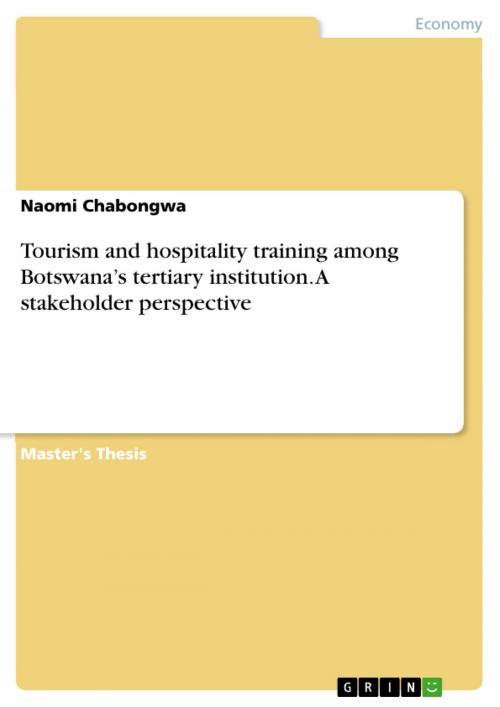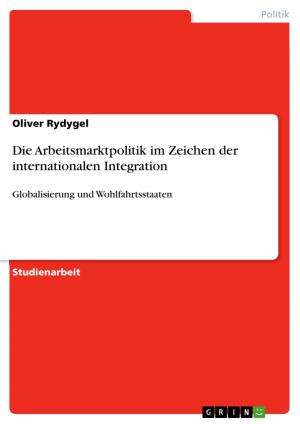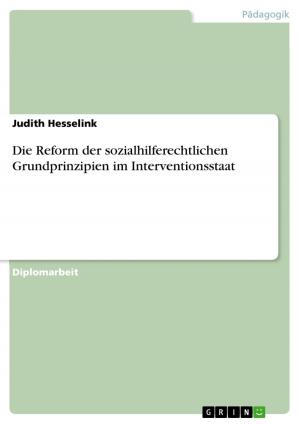Tourism and hospitality training among Botswana's tertiary institution. A stakeholder perspective
Business & Finance, Industries & Professions, Hospitality, Tourism & Travel| Author: | Naomi Chabongwa | ISBN: | 9783668487819 |
| Publisher: | GRIN Verlag | Publication: | July 20, 2017 |
| Imprint: | GRIN Verlag | Language: | English |
| Author: | Naomi Chabongwa |
| ISBN: | 9783668487819 |
| Publisher: | GRIN Verlag |
| Publication: | July 20, 2017 |
| Imprint: | GRIN Verlag |
| Language: | English |
Master's Thesis from the year 2014 in the subject Tourism, grade: pass, Midlands State University (Midlands State University), course: Masters of Commerce in Tourism and Hospitality, language: English, abstract: This study was carried out to appraise the tourism and hospitality training in Botswana's institutions from a stakeholder's perspective. The stakeholders in this research were limited to the students and trainers/lecturers. The objectives of the study were: to determine stakeholders perceptions on the strengths of tourism and hospitality training among Botswana's tertiary institutions, to determine stakeholders perceptions on the weaknesses of tourism and hospitality training among Botswana's tertiary institutions, to determine the challenges faced by tourism and hospitality tertiary institutions with regard to delivering tourism training, to recommend strategies that may be adopted to improve the quality of tourism and hospitality training among Botswana's tertiary institutions. The purpose of the research was to examine the existing gap between the tourism and hospitality training and tourism manpower needs in Botswana. Current literature evaluation on the hospitality and tourism education and training shows a number of differences for the tourism and hospitality manpower needs especially in developed countries. The study adopted a qualitative technique which involved both students and industry staff filling the questionnaires and also head of departments, trainers and managers were interviewed. Purposive and convenience sampling were used in order to select the participants. Semi-structured interview questions were used in the study as a method of data collection, and the study targeted seventy five students in all the institutions and two lecturers in each institution of four. One head of department in each institution, fifteen industry staff from all the four establishments, two managers from each establishment were interviewed. The study revealed that there is shortage of resources and current training curriculum is negatively impacting the effectiveness of the training institutions. The findings point out those learners is trained with limited resources and therefore some students produced by the institutions are not competent enough to face the labour market. The study recommended among other things to make the curricula more practical and equip trainers with the necessary skills that will give them more opportunity to carry out research. This will enable them to be effective and assist the academic institutions in Botswana in generating quality tourism and hospitality learners to work in the industry for future challenges.
Master's Thesis from the year 2014 in the subject Tourism, grade: pass, Midlands State University (Midlands State University), course: Masters of Commerce in Tourism and Hospitality, language: English, abstract: This study was carried out to appraise the tourism and hospitality training in Botswana's institutions from a stakeholder's perspective. The stakeholders in this research were limited to the students and trainers/lecturers. The objectives of the study were: to determine stakeholders perceptions on the strengths of tourism and hospitality training among Botswana's tertiary institutions, to determine stakeholders perceptions on the weaknesses of tourism and hospitality training among Botswana's tertiary institutions, to determine the challenges faced by tourism and hospitality tertiary institutions with regard to delivering tourism training, to recommend strategies that may be adopted to improve the quality of tourism and hospitality training among Botswana's tertiary institutions. The purpose of the research was to examine the existing gap between the tourism and hospitality training and tourism manpower needs in Botswana. Current literature evaluation on the hospitality and tourism education and training shows a number of differences for the tourism and hospitality manpower needs especially in developed countries. The study adopted a qualitative technique which involved both students and industry staff filling the questionnaires and also head of departments, trainers and managers were interviewed. Purposive and convenience sampling were used in order to select the participants. Semi-structured interview questions were used in the study as a method of data collection, and the study targeted seventy five students in all the institutions and two lecturers in each institution of four. One head of department in each institution, fifteen industry staff from all the four establishments, two managers from each establishment were interviewed. The study revealed that there is shortage of resources and current training curriculum is negatively impacting the effectiveness of the training institutions. The findings point out those learners is trained with limited resources and therefore some students produced by the institutions are not competent enough to face the labour market. The study recommended among other things to make the curricula more practical and equip trainers with the necessary skills that will give them more opportunity to carry out research. This will enable them to be effective and assist the academic institutions in Botswana in generating quality tourism and hospitality learners to work in the industry for future challenges.















